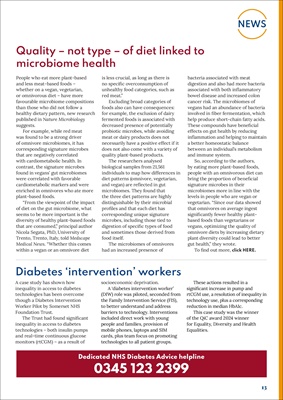
13
NEWS
Diabetes 'intervention' workers
A case study has shown how
inequality in access to diabetes
technologies has been overcome
though a Diabetes Intervention
Worker Pilot by Somerset NHS
Foundation Trust.
The Trust had found significant
inequality in access to diabetes
technologies - both insulin pumps
and real-time continuous glucose
monitors (rtCGM) - as a result of
socioeconomic deprivation.
A 'diabetes intervention worker' (DIW)
role was piloted, seconded from the
Family Intervention Service (FIS),
to better understand and address
barriers to technology. Interventions
included direct work with young
people and families, provision of
mobile phones, laptops and SIM
cards, plus team focus on promoting
technologies to all patient groups.
These actions resulted in a significant
increase in pump and rtCGM use, a
resolution of inequality in technology
use, plus a corresponding reduction
in median HbA1c.
This case study was the winner of the
QiC award 2024 winner for Equality,
Diversity and Health Equalities.
Quality - not type - of diet linked to
microbiome health
People who eat more plant-based
and less meat-based foods -
whether on a vegan, vegetarian,
or omnivorous diet - have more
favourable microbiome compositions
than those who did not follow a
healthy dietary pattern, new research
published in Nature Microbiology
suggests.
For example, while red meat was
found to be a strong driver of
omnivore microbiomes, it has
corresponding signature microbes
that are negatively correlated
with cardiometabolic health. In
contrast, the signature microbes
found in vegans' gut microbiomes
were correlated with favorable
cardiometabolic markers and were
enriched in omnivores who ate more
plant-based foods.
"From the viewpoint of the impact
of diet on the gut microbiome, what
seems to be more important is the
diversity of healthy plant-based foods
that are consumed," principal author
Nicola Segata, PhD, University of
Trento, Trento, Italy, told Medscape
Medical News. "Whether this comes
within a vegan or an omnivore diet
is less crucial, as long as there is
no specific overconsumption of
unhealthy food categories, such as
red meat."
Excluding broad categories of foods
also can have consequences: for
example, the exclusion of dairy
fermented foods is associated with
decreased presence of potentially
probiotic microbes, while avoiding
meat or dairy products does not
necessarily have a positive effect if it
does not also come with a variety of
quality plant-based products.
The researchers analysed biological
samples from 21,561 individuals to
map how differences in diet patterns
(omnivore, vegetarian, and vegan) are
reflected in gut microbiomes. They
found that the three diet patterns
are highly distinguishable by their
microbial profiles and that each diet
has corresponding unique signature
microbes, including those tied to
digestion of specific types of food
and sometimes those derived from
food itself.
The microbiomes of omnivores had
an increased presence of bacteria
associated with meat digestion and
also had more bacteria associated
with both inflammatory bowel
disease and increased colon cancer
risk. The microbiomes of vegans had
an abundance of bacteria involved
in fiber fermentation, which help
produce short-chain fatty acids.
These compounds have beneficial
effects on gut health by reducing
inflammation and helping to maintain
a better homeostatic balance
between an individual's metabolism
and immune system.
So, according to the authors, by
eating more plant-based foods,
people with an omnivorous diet can
bring the proportion of beneficial
signature microbes in their
microbiomes more in line with the
levels in people who are vegan or
vegetarian. "Since our data showed
that omnivores on average ingest
significantly fewer healthy plantbased
foods than vegetarians or
vegans, optimizing the quality of
omnivore diets by increasing dietary
plant diversity could lead to better
gut health," they wrote.
To find out more, click HERE.
Dedicated NHS Diabetes Advice helpline
0345 123 2399